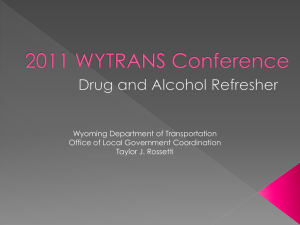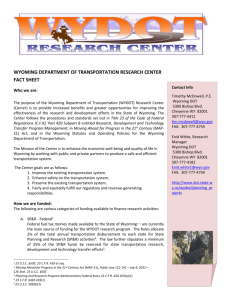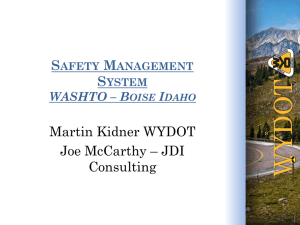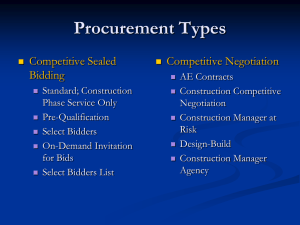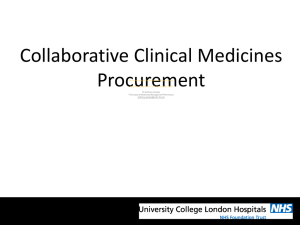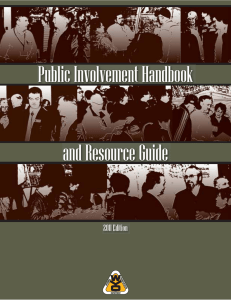2013 Procurement Training Presentation
advertisement
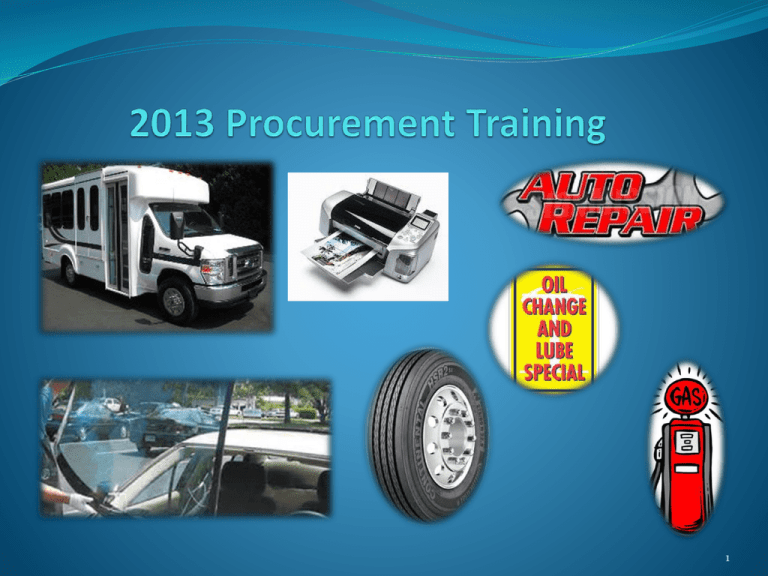
1 Goals High Risk Activity – National reviews consistently find problems in the methodology Recipients (WYDOT) and Sub-recipients (you) use when making purchases with federal money WYDOT Transit Staff would like to: Explain the hierarchy of the regulations Provide simple guidance Different requirements based on purchase amount Limit liability Both yours and ours Allow for autonomy with accountability Answer your questions related to procurement 2 Why buy? When determining the purchase ask these questions to determine if the purchase is applicable to your Transportation program: Is it Reasonable? Top of the line item, mid grade or bottom of the barrel Is it Necessary? Consider the severity of the need Is it Allowable? Remember this is for your Transportation Program If in doubt, ask the WYDOT staff 3 Definitions Procurement: The act of obtaining or buying goods and services. The process includes preparation and processing of a demand as well as the end receipt and approval of payment. It often involves: (1) purchase planning, (2) standards determination, (3) specifications development, (4) supplier research and selection, (5) value analysis, (6) financing, (7) price negotiation, (8) making the purchase, (9) supply contract administration, (10) inventory control and stores, and (11) disposals and other related functions. Micro-Purchases: Purchases of goods or services under $2,500 Small Purchases: Purchases of goods or services between $2,501 and $7,500 Large Purchases: Purchases of goods or services $7,501 and above Prohibited Divisions The recipient or sub-recipient may not divide or reduce the size of its procurement to avoid the additional procurement requirements applicable to larger acquisitions Price Analysis when adequate price competition and to determine the reasonableness of the proposed contract price. Cost Analysis necessary when adequate price competition is lacking and for sole source procurements 4 In Accordance With: 49 CFR Part 18 – Uniform administrative requirements for grants and cooperative Highest Level agreements to state and local governments 49 CFR Part 19- Uniform administrative requirements for grants and agreements with institutions of higher education, hospitals, and other non-profit organizations FTA C 4220.1F Third Party Contracting Guidance-Rev. 4, March 18, 2013 Copy on WYDOT webpage Best Practices Procurement Manual Wyo. Stat. § 9-2-1016 General Services Division WYDOT OP 24-9 Purchasing and Contracting Copy on WYDOT webpage Local policy Lowest Level 5 In Accordance With Per your WYDOT Agreement, General Conditions 4 c. : Purchase of Project Equipment. The purchase of all Project Equipment financed in whole or in part pursuant to this Agreement shall be undertaken by WYDOT on behalf of the Recipient or with prior WYDOT approval in accordance with the procedures established by WYDOT. Purchases of over $1,000 using Federal or State funds will be subject to approval of WYDOT in accordance with established procedures. WYDOT will evaluate your procurement and bid package before bid is advertised 6 Excluded Parties List System FTA C 4220.1F CHAPTER IV 2 a2 (b) General Services Administration (GSA) Excluded Parties List System FTA strongly recommends that the recipient check the Excluded Parties List System (EPLS). Now a part of the System for Awards Management (SAM), the EPLS is an electronic, web-based system that identifies those parties excluded from receiving Federal contracts. Per your WYDOT Agreement, General Conditions (t) : Suspension and Debarment- you are required to check the EPLS system for your vendors. www.sam.gov Keep copy of results in your file 7 TYPES OF PROCUREMENT Micro Purchase – under $2,500 When Appropriate - when there is a reasonable need in your Transportation program. Procedures - The following procedures apply to micropurchases: Competition. The recipient should distribute micropurchases equitably among qualified suppliers. Rotating through a list of the suppliers is one method to equitably distribute the micro-purchases among qualified suppliers. Per Internal WYDOT Policy. Attain at least three price quotes comparing apples to apples. Use local vendors and internet quotes. Keep records showing the purchase is fair and reasonable. Prohibited Divisions - Apply 8 TYPES OF PROCUREMENT Small Purchases - $2,501 – 7,500 When Appropriate - when there is a reasonable and necessary need in your Transportation program for purchases. Procedures - When using small purchase procedures: The recipient must obtain written price or rate quotations from at least three qualified sources, local and online if applicable. Compare apples to apples, same specifications. The name and address of the vendor. The vendor’s authorized representative’s name and signature. Prices. The FOB (free on board) point (which determines who pays freight charges) The terms (Net 45 and so forth). The date. The delivery time. Prohibited Divisions - Apply 9 TYPES OF PROCUREMENT Large Purchases - $7,501 or greater Competitive Sealed Bidding Invitation For Bid (IFB) - Based on specific quantities and criteria. Procedures - The IFB should be publicly advertised. Ensure the bids are solicited from an adequate number of known suppliers . The Specs will describe the property or services sought in sufficient detail that a prospective bidder will be able to submit a proper bid. Bidders are allowed sufficient time to prepare bids before the date of bid opening, typically three weeks. All bids are publicly opened at the time and place prescribed in the invitation for bids. A firm fixed price contract is usually awarded in writing to the lowest responsive and responsible bidder . Any or all bids may be rejected if there is a sound, documented business reason; late, incomplete or does not meet the specifications. Prohibited Divisions - Apply 10 METHODS OF PROCUREMENT Competitive Proposals (Request for Proposals) Requests for proposals (RFPs) may be used when configuration or performance specifications can not be clearly defined and when cost is not the only criteria in determining award. When Appropriate. Competitive proposals should be used when the property or services to be acquired are described in a performance or functional specification or when uncertain about whether more than one bid will be submitted. Separate discussions with individual offeror(s) are expected to be necessary after they have submitted their proposals. 11 METHODS OF PROCUREMENT Architectural Engineering (A&E) Services and Other Services. Professional services of an architectural or engineering nature performed by contract that are associated with research, planning, development, design, construction, alteration, or repair of real property. WYDOT has approved template procedures in Operating Policy 40- 1, Consultant Services Agreements. 12 METHODS OF PROCUREMENT Noncompetitive negotiation may be used to purchase materials, supplies, equipment, printing and services if the item or service to be purchased is: For an emergency situation. For compatibility with existing equipment or systems. To support a special program for which the product has unique characteristics essential to the program’s needs. For items covered by patent or copyright. For trial and evaluation prior to specification development. The only known source. Documentation must be submitted with requisition. One for which users have had extensive training and experience and the use of any other similar piece of equipment would require considerable reorientation and training. To secure pre-negotiated cooperative contract pricing, such as with General Services Administration (GSA) pricing, state co-operative agreements, U.S. Communities contracts, WSCA contracts, and so forth. The contract number must be listed on the requisition. 13 In Summary Per your WYDOT Agreement, General Conditions 4 c. : Purchase of Project Equipment. The purchase of all Project Equipment financed in whole or in part pursuant to this Agreement shall be undertaken by WYDOT on behalf of the Recipient or with prior WYDOT approval in accordance with the procedures established by WYDOT. Purchases of over $1,000 using Federal or State funds will be subject to approval of WYDOT in accordance with established procedures. 14 In Summary If you have a purchase $2,500 or under (Micro Purchase) Per Internal WYDOT Policy-Attain at least three price quotes comparing apples to apples. Use local vendors and internet quotes. Keep all records in your procurement files, if it’s not in the file it didn’t happen! 15 In Summary If your purchase is between $2,501 and $7,500 (Small Purchase) Attain at least three price quotes comparing apples to apples. Use local vendors and internet quotes. Keep all records in your procurement files, if it’s not in the file it didn’t happen! 16 In Summary If your purchase is $7,501 or greater (Large Purchase) Invitation For Bid (IFB). Based on specific quantities and criteria. Keep all records in your procurement files, if it’s not in the file it didn’t happen! 17 Reference Tools Your Procurement Manual If you don’t currently have one you can adopt ours on the WYDOT home page. WYDOT staff is available for assistance. Ensure your board or governing body approves and signs it. Keep all records in your procurement files, if it’s not in the file it didn’t happen! 18 Reference Tools FTA Website Reference the Procurement Section RTAP (Rural Transit Assistance Program)– Procurement Pro Find your Federal Clauses for a given purchase WYDOT Transit - Procurement Webpage Best Practice Procurement Manual 4220.1F Third Party Contracting Guidance 19 Reference Tools Guidance on Cost and Price Analysis. FTA recognizes that some recipients may have difficulty obtaining the information necessary to conduct a proper cost or price analysis. Use the following resources as guidance in preparing cost or price analyses: FTA’s “Best Practices Procurement Manual,” Chapter 5, The National Transit Institute Course, “Cost or Price Analysis and Risk Assessment,” Pricing Guide for FTA Grantees, FTA Web Site: http://www.fta.dot.gov/documents/Helpline_Price_Guide.doc. FAR Part 31, Contract Cost Principles and Procedures, and Defense Contract Audit Agency Audit Manual. See, the DCAA Web site: http://www.dcaa.mil. 20 Reference Tools- WYDOT Webpage 21
